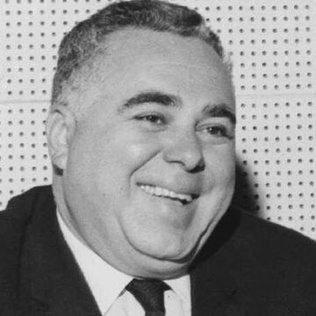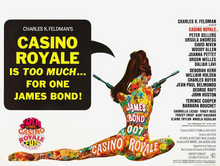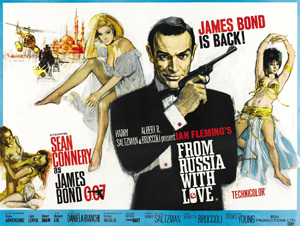Related Research Articles

Diamonds Are Forever is a 1971 spy film and the seventh film in the James Bond series produced by Eon Productions. It is the sixth and final Eon film to star Sean Connery, who returned to the role as the fictional MI6 agent James Bond, having declined to reprise the role in On Her Majesty's Secret Service (1969).

Kevin O'Donovan McClory was an Irish screenwriter, film producer, and film director. McClory was best known for producing the James Bond film Thunderball and for his legal battles with the character's creator, Ian Fleming.

Michael Gregg Wilson, is an American-British screenwriter and film producer, best known for his association with the James Bond film series.

Stewart Terence Herbert Young was a British film director and screenwriter who worked in the United Kingdom, Europe and Hollywood. He is best known for directing three James Bond films: the first two films in the series, Dr. No (1962) and From Russia with Love (1963), and Thunderball (1965). His other films include the Audrey Hepburn thrillers Wait Until Dark (1967) and Bloodline (1979), the historical drama Mayerling (1968), the infamous Korean War epic Inchon (1981), and the Charles Bronson films Cold Sweat (1970), Red Sun (1971), and The Valachi Papers (1972).

René Clément was a French film director and screenwriter. He is known for directing the films The Battle of the Rails (1946), Forbidden Games (1952), Gervaise (1956), Purple Noon (1960), and Is Paris Burning (1966). He received numerous accolades including five prizes at the Cannes Film Festival and the Honorary César in 1984.

Herschel "Harry" Saltzman was a Canadian theatre and film producer. He is best remembered for co-producing the first nine of the James Bond film series with Albert R. Broccoli. Apart from a ten-year stint living in St. Petersburg, Florida, he lived most of his life in Denham, Buckinghamshire, England.
Richard Maibaum was an American screenwriter, film producer, and playwright, best known for his work on the James Bond films. He wrote 13 of the 16 Eon Productions Bond films produced between 1962 and 1989, beginning with Dr. No and ending with Licence to Kill.

James Bond, The Spy Who Loved Me is the official novelization of the 1977 Eon James Bond filmThe Spy Who Loved Me, which was itself inspired by the 1962 novel of the same title by Ian Fleming.

Casino Royale is a 1967 spy parody film originally distributed by Columbia Pictures. It is loosely based on the 1953 novel of the same name by Ian Fleming; the first novel to feature the character James Bond.

Thomas Frank Mankiewicz was an American screenwriter, director, and producer of motion pictures and television whose credits included James Bond films and his contributions to Superman: The Movie (1978) and the television series Hart to Hart. He was the son of Joseph Mankiewicz and nephew of Herman Mankiewicz. He is not related to the similarly named Wolf Mankowitz who worked on the first James Bond film, uncredited.

Thunderball is a 1965 spy film and the fourth in the James Bond series produced by Eon Productions, starring Sean Connery as the fictional MI6 agent James Bond. It is an adaptation of the 1961 novel of the same name by Ian Fleming, which in turn was based on an original screenplay by Jack Whittingham devised from a story conceived by Kevin McClory, Whittingham, and Fleming. It was the third and final Bond film to be directed by Terence Young, with its screenplay by Richard Maibaum and John Hopkins.

The Man with the Golden Gun is a 1974 spy film and the ninth in the James Bond series produced by Eon Productions, and the second to star Roger Moore as the fictional MI6 agent James Bond. A loose adaptation of Ian Fleming's posthumously published 1965 novel of the same name, the film has Bond sent after the Solex Agitator, a breakthrough technological solution to contemporary energy shortages, while in a game of cat and mouse facing the assassin Francisco Scaramanga, the "Man with the Golden Gun". The action culminates in a duel between them that settles the fate of the Solex.

On Her Majesty's Secret Service is a 1969 spy film and the sixth in the James Bond series produced by Eon Productions. It is based on the 1963 novel by Ian Fleming. Following Sean Connery's decision to retire from the role after You Only Live Twice, Eon selected George Lazenby, a model with no prior acting credits, to play the part of James Bond. During filming, Lazenby announced that he would play the role of Bond only once. Connery returned to portray Bond in 1971's Diamonds Are Forever.

The Spy Who Loved Me is a 1977 spy film, the tenth in the James Bond series produced by Eon Productions. It is the third to star Roger Moore as the fictional secret agent James Bond. The film co-stars Barbara Bach and Curt Jürgens and was directed by Lewis Gilbert. The screenplay was by Christopher Wood and Richard Maibaum, with an uncredited rewrite by Tom Mankiewicz.

Dr. No is a 1962 British spy film directed by Terence Young. It is the first film in the James Bond series. Starring Sean Connery, Ursula Andress, Joseph Wiseman and Jack Lord, it was adapted by Richard Maibaum, Johanna Harwood, and Berkely Mather from the 1958 novel by Ian Fleming. The film was produced by Harry Saltzman and Albert R. Broccoli, a partnership that continued until 1975. It was followed by From Russia with Love in 1963. In the film, James Bond is sent to Jamaica to investigate the disappearance of a fellow British agent. The trail leads him to the underground base of Dr. Julius No, who is plotting to disrupt an early American space launch from Cape Canaveral with a radio beam weapon.

Live and Let Die is a 1973 spy film, the eighth film in the James Bond series produced by Eon Productions, and the first to star Roger Moore as the fictional MI6 agent James Bond. It was directed by Guy Hamilton and produced by Albert R. Broccoli and Harry Saltzman, while Tom Mankiewicz wrote the script.

From Russia with Love is a 1963 spy film and the second in the James Bond series produced by Eon Productions, as well as Sean Connery's second role as MI6 agent 007 James Bond.
Cyril Wolf Mankowitz was an English writer, playwright and screenwriter. He is particularly known for four novels— Make Me an Offer (1952), A Kid for Two Farthings (1953), My Old Man's a Dustman and Expresso Bongo (1958)—and other plays, historical studies, and the screenplays for many successful films which have received awards including the Oscar, Bafta and the Cannes Grand Prix.
The James Bond film series is a British series of spy films based on the fictional character of MI6 agent James Bond, "007", who originally appeared in a series of books by Ian Fleming. It is one of the longest continually running film series in history, having been in ongoing production from 1962 to the present. In that time, Eon Productions has produced 25 films as of 2021, most of them at Pinewood Studios. With a combined gross of over $7 billion, the films produced by Eon constitute the fifth-highest-grossing film series. Six actors have portrayed 007 in the Eon series, the latest being Daniel Craig.

The Red Beret is a 1953 British-American war film directed by Terence Young and starring Alan Ladd, Leo Genn and Susan Stephen.
References
- 1 2 3 The British Film and Television Yearbook. Vol. 10. 1960. p. 154.
- 1 2 3 4 5 O'Shannon, Finuala (1966). "Johanna's Ambition". Irish Digest. 85 (3): 24.
- ↑ Profile, Sunday Independent, 18 August 2019, p. 22.
- ↑ Rockett 1996, p. 18.
- ↑ Harwood, Johanna M. (November 1959). "For Women — Long Skis in Kitzbuhel". Punch . 237: 475.
- 1 2 3 4 Field, Matthew (2012). "Johanna Harwood Interview". Movie Classics: A Cinema Retro Special Edition Magazine (4). Solo Publishing.
- ↑ "Finding Aid for Lucille Kallen papers, 1938-1999". New York Public Library for the Performing Arts#Billy Rose Theatre Division. December 2004.
- ↑ The Stage Year Book. London: Carson & Comerford. 1962. p. 71.
- ↑ "Flat for Six". Plays and Players. 9–10: (23?). October 1961.
- ↑ Southern 2004, p. 194.
- ↑ Hill 2010.
- ↑ Saltzman, Harry. (1959) "Films and Filming". Also mentions upcoming production of Casino Royal [sic].
- ↑ Broccoli 1998, p. 158.
- ↑ Broccoli 1998, p. 159.
- ↑ Inside Dr. No Documentary (DVD). Dr. No (Ultimate Edition, 2006): MGM Home Entertainment. 1999.
- ↑ McGilligan 1986, p. 286.
- ↑ Audio commentary (DVD). Dr. No (Ultimate Edition, 2006): MGM Home Entertainment. 1999.
- ↑ McGilligan 1986, p. 284.
- ↑ p. 79 Kremer, Daniel Sidney J. Furie: Life and Films University Press of Kentucky, 9 Oct 2015
- ↑ Sasportas, Valérie (7 June 2012). "Les Fauves de René Clément aux enchères". Le Figaro.